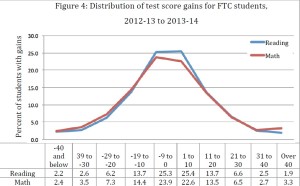Florida’s tax credit scholarships continue to draw some of the state’s most disadvantaged students from struggling public schools, according to the latest evaluation of the program by independent researchers.

After the students enroll in private schools on the scholarship, they tend to keep pace with their peers around the country, making about a year’s worth of academic progress in a year’s time.
The report for the 2013-14 school year, released by the state Department of Education on Tuesday, is based on test scores for more than 27,000 students in grades 3-10. It is the eighth evaluation of its kind, and the first conducted by a team from the Learning Systems Institute at Florida State University, which took over the role after a 2014 change in state law.
While the findings are similar to previous years, they cover more students, and include results for more individual schools, than ever before.
The tax credit scholarship program is administered by Step Up For Students, which co-hosts this blog and employs the author of this post. It is the largest private school choice program in the country, and served nearly 60,000 students in the year covered by the report.
New scholarship students were more likely to be black, less likely to be white or Hispanic, and less likely to be English language learners than the low-income students who qualified for the program but did not participate. They also tended to score lower on standardized tests in public schools, and were more likely to come from schools that struggled academically. More than 25 percent of scholarship students came from public schools that had been rated “D” or “F” in the previous year.
“New [scholarship] students, as in previous years, tend to come from lower-performing public schools prior to entering the program,” the report states. “Moreover, they are more likely to be among the lower performing students in their prior school before attending the program, regardless of the performance level of their public school.”
The new evaluation also reports learning gains for scholarship students at 158 private schools, 48 more than the previous year. (Though scholarship students that year attended more than 1,400 schools, the state reports learning gains only for individual schools with at least 30 scholarship students who have current and previous-year test scores.)
Learning gains compare students’ national percentile scores from one year to the next. If students’ percentile rankings hold constant from one year to the next, they can be said to have made about a year’s worth of progress.
There is considerable variation among schools. Researchers found most of the schools achieved roughly the same learning gain as the program overall — a year’s worth of growth in a year’s time. But they also found 18 schools where students’ three-year average gains were significantly greater than the norm, and 31 schools where they were significantly less.
In their conclusion, the researchers note scholarship students overall appear to be keeping pace with their peers.
“[T]he typical FTC student tends to maintain his or her relative position in comparison with all students nationally both in mathematics and reading,” they write. “It is important to note that these national comparisons pertain to all students nationally, and not just students from low-income families.”


